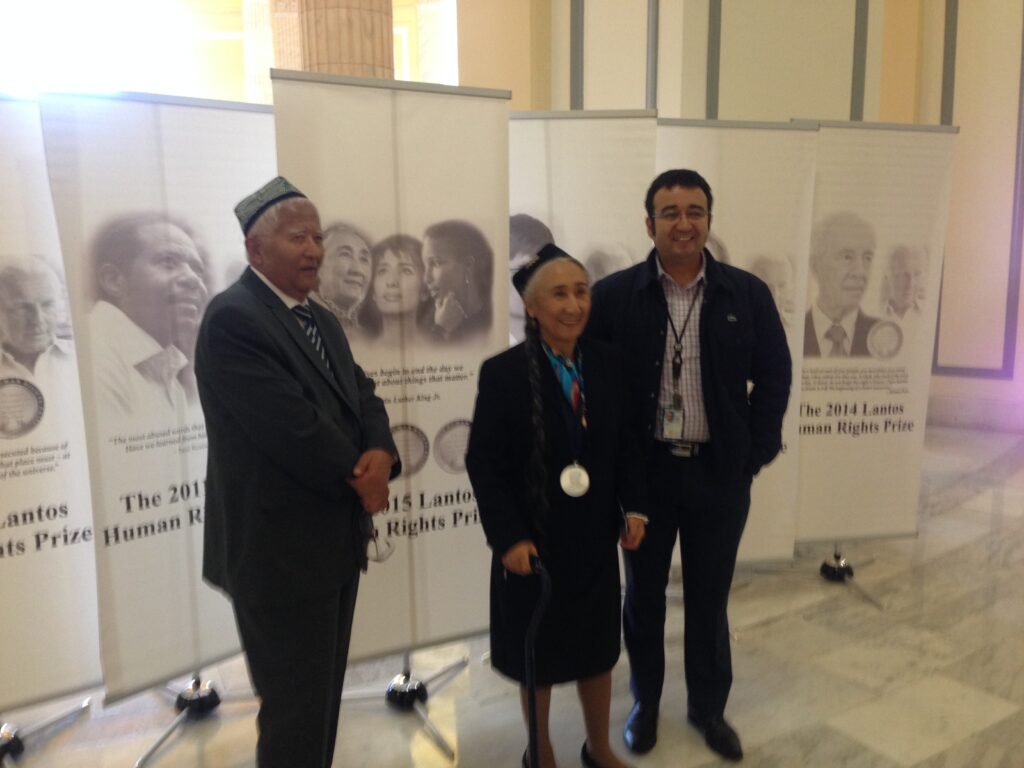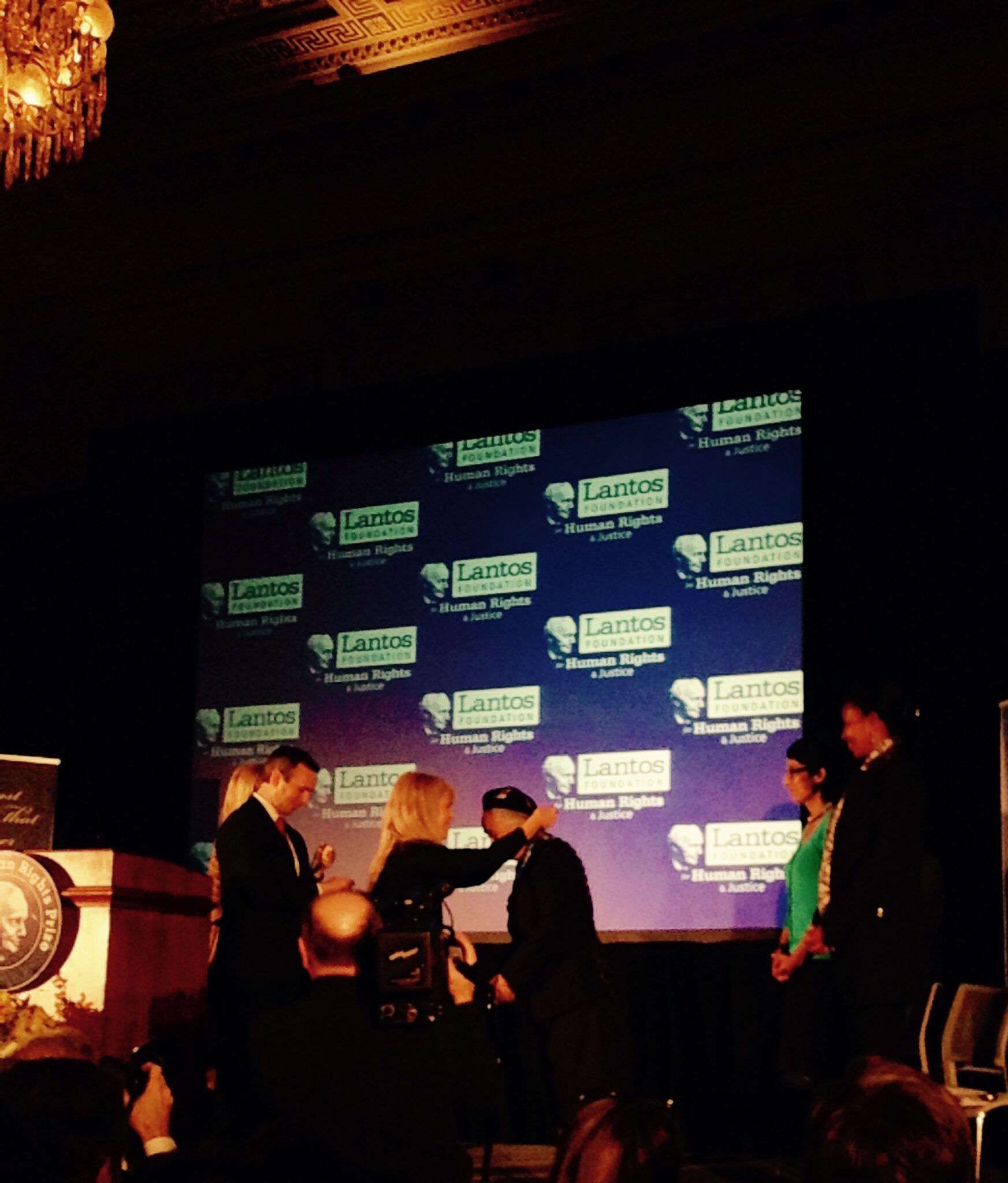Rebiya Kadeer: 2015 Lantos Human Rights Prize Remarks

December 9, 2015
On the occasion of Human Rights Day 2015, the Lantos Foundation for Human Rights and Justice presented Uyghur democracy leader Rebiya Kadeer with the 2015 Lantos Human Rights Prize alongside fellow awardees Irshad Manji and Ayaan Hirsi Ali. All three women have demonstrated courage and conviction in their dedication to human rights, Ms. Kadeer on behalf of the Uyghur people in their struggle against grave human rights abuses committed by the Chinese government. The award was presented in a ceremony on Capitol Hill by the late Congressman Tom Lantos’s daughters Annette Lantos and Katrina Lantos Swett on behalf of the Foundation.

The following are remarks delivered by Ms. Kadeer upon accepting her award:
It is a very great privilege to speak to you today. I want to thank The Lantos Foundation for Human Rights and Justice for assembling such distinguished guests to celebrate Human Rights Day and to demonstrate our collective strength.
Eleanor Roosevelt once said: “Many people will walk in and out of your life, but only true friends will leave footprints in your heart.” So it is with great humility that I stand before you on this occasion honored with the 2015 Lantos Human Rights Prize. Tom Lantos was my true friend. His passing was not only a sad day for rights defenders across the world, but also a great personal loss. Tom Lantos embodied integrity, truth and above all justice. His support for my release from a Chinese jail and for the Uyghur cause of human rights and democracy kept hope alive in dark days.
And now, his legacy continues through the critical work of his family and The Lantos Foundation for Human Rights and Justice. The leadership in championing the rights of religious minorities displayed by Katrina Lantos Swett at the U.S. Commission on International Religious Freedom and the lifelong commitment of Tom’s widow, Mrs. Annette Lantos, in resisting tyranny keep a message of compassion and tolerance alive.
I am also honored to share the prize with Irshad Manji, and Ayaan Hirsi Ali. Their brave work is an inspiration to the marginalized people of the world and demonstrates the endurance of nonviolent resolutions to conflict. That we share this award is testament to the integral part Muslim women have in leadership of their communities. Our common faith shows that Islam has a role to play in bringing peace and progress in a globalized world.
Since the terror attacks on the United States in 2001, the Chinese government has attempted to cast Uyghurs as religious extremists in order to justify a fierce crackdown in East Turkestan. After the recent tragic events in Paris, China once again has seized a political opportunity to seek international approval of its repressive policies targeting Uyghurs.
Let me state this categorically, the Uyghurs are a people of peace and development. They reject the ideologies of extremists that threaten the welfare of humanity. The Uyghur issue is not a Uyghur problem. It is a Chinese government problem. A situation generated by systematic denial to Uyghurs of fundamental human rights and freedoms. Concerned people should not yield to Chinese narratives that deflect scrutiny of its record in East Turkestan.
It is not surprising Chinese officials work hard to conceal events in East Turkestan as the Uyghur people face gross human rights violations on a daily basis. A number of agencies have detailed a broad range of rights concerns regarding Uyghurs, including: enforced disappearances; jailing of political dissidents, journalists and webmasters; repression of independent religious leaders; forced abortions; destruction of cultural heritage; restrictions of movement and formidable obstacles in obtaining a passport; tight controls on freedom of expression, particularly on the internet; marginalization of the Uyghur language in education and society; pressures exerted on foreign governments to refoul refugees; targeted surveillance; and suppression of non-state sanctioned religious association and assembly.
Since Xi Jinping became China’s president, human rights violations of the Uyghur people have intensified. Excessive force and extrajudicial killings are now a common feature of the Chinese state’s security approach to the region. The disproportionate use of force during house-to-house searches, at security checkpoints and during peaceful demonstrations has led to credible allegations of state initiated violence. China’s lack of transparency surrounding incidents of state violence in East Turkestan and conflation between peaceful dissent and violence should cause alarm among independent observers.
Another concerning dimension to the Uyghur issue is how the Chinese government prevents Uyghurs from questioning repressive policies. The Chinese state’s persecution of Uyghur academic Ilham Tohti and his family demonstrate how even working within the system is a threat.
Using legitimate and peaceful means to initiate a meaningful dialogue with the state on the deplorable conditions facing the Uyghurs, Ilham Tohti was targeted by the Chinese authorities and sentenced to life in prison in September 2014 in a legal process that was highly politicized.
Seven of Ilham Tohti’s students who were given prison sentences of up to eight years in December 2014. Perhat Halmurat, Shohret Nijat, Mutellip Imin, Abduqeyyum Ablimit, Atikem Rozi, Akbar Imin and Luo Yuwei worked as volunteers on Professor Tohti’s website, Uighurbiz.
The trial of Ilham Tohti and his students, as well as the targeting of other Uyghur activists, send a strong message that the government will not tolerate any form of Uyghur opposition and displays the extent of Uyghur exclusion from meaningful participation in determining regional policies. That Chinese official media labeled Ilham Tohti as the “brains” behind terrorists should confirm deep skepticism of Chinese government terror claims.
In a world growing more tolerant of anti-Islamic rhetoric, it is the responsibility of enlightened governments to speak out for Muslims facing human rights violations in the name of anti-terror. This could take on no better form than a firm rejection of Chinese accusations of widespread radicalization in East Turkestan and a public stance in favor of the Uyghur peoples’ fundamental rights.
Uyghurs have always extended friendship to peoples beyond East Turkestan. Given its central role in the ancient Silk Road, East Turkestan could be considered the blueprint for contemporary globalization through its tolerance of other faiths and ideas. Now is the time for the world’s democracies to support Uyghurs in realizing their aspirations of freedom and human rights. Uyghurs share the common vision of a world as a place of development, respect and justice for all human beings.
As a former political prisoner, I can testify to the power of openly raising human rights issues with the Chinese authorities. Whenever officials from democratic countries or advocates from rights groups brought my case up to the Chinese government, not only did the conditions of my incarceration improve, but also my hope increased that the pressure would result in my release, as it eventually did in 2005.
Publicly mentioning the repression and undemocratic practices of the Chinese government in trips to China educates and alerts the general public to the falsehood that all is well in China. Publicly raising the Uyghur issue would simultaneously fill millions of Uyghurs with hope, as well as shine a light for those among the world’s public who do not yet know of the egregious human rights abuses facing the Uyghur people. It is often stated that knowledge is power and the more the public knows about the Uyghur issue the more pressure can be brought to bear on the Chinese government to reform its repressive policies.
I want to express my deep admiration to The Lantos Foundation for Human Rights and Justice for its recognition of the dire conditions faced by Uyghurs. In a time when China’s economic prowess is increasingly silencing criticism of the Chinese government, even in democracies, this strong statement of support counts more than ever. The honor of accepting the 2015 Lantos Human Rights Prize is a further expression of solidarity with the Uyghur people and on behalf of all Uyghurs I extend our friendship in return.
Thank you.
